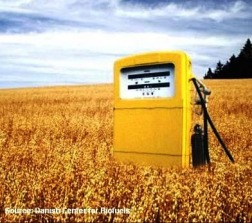Generations of Biofuels

Fuel from Corn
With time biofuels have changed, meeting new demands, conforming to public opinions, over coming challenging issues and striving for a truly sustainable method for energy production. The reemergence of First Generation Biofuel technology was hailed as “ a salvation from the twin evils of high oil prices and climate change”[1]. However, it was soon discovered that this method of biofuel production increased global food prices. Second Generation Biofuel technology was design to produced energy from materials that would not impact the food chain, such as wood and crop waste. Before this technology was fully researched a third generation of biofuels was being developed. This generation targeted the feedstock side of the process, looking at using materials that would not compete with crops for land or water. Even now a fourth generation of biofuels is being conceived. It is hoped that by using carbon capture and storage that this technology will be ‘carbon negative’ rather than just ‘carbon neutral.
Read more
Read more
Types of Biofuels

Growing Fuel
Biofuels are liquid, solid, or gaseous fuels produced during the conversion of biomass. They can be produced from virtually any organic biomass but some materials produce higher efficiencies than others. The biofuel can be burned directly or they can be mixed with conventional fuels. Due to the diversity of biomass a wide range of technologies must be used to ensure that the energy is derived in the most efficient manner. With each technology a different from of biofuel is produced. The most common biofuel is bioethanol, a bioalcohol produced from sugar or corn for example. Biodiesel is another first generation biofuel produced by extracting oil from crops such as rapeseed. Biogas and Biohydrogen are produced during the fermentation of organic material and Biobutanol in the chemical decomposition of organic materials.
Read more
References
[1] Biofuels look to the next generation; http://news.bbc.co.uk/1/hi/sci/tech/5353118.stm
[1] Biofuels look to the next generation; http://news.bbc.co.uk/1/hi/sci/tech/5353118.stm
Picture Fuel from Corn courtesy of http://keetsa.com/blog/green/green-transportation/winners-announced-in-2007-biomass-genomics-grants/
Picture Growing Fuel courtesy of http://global-warming.accuweather.com/2008/02/bad_news_for_biofuels.html
Picture Growing Fuel courtesy of http://global-warming.accuweather.com/2008/02/bad_news_for_biofuels.html
